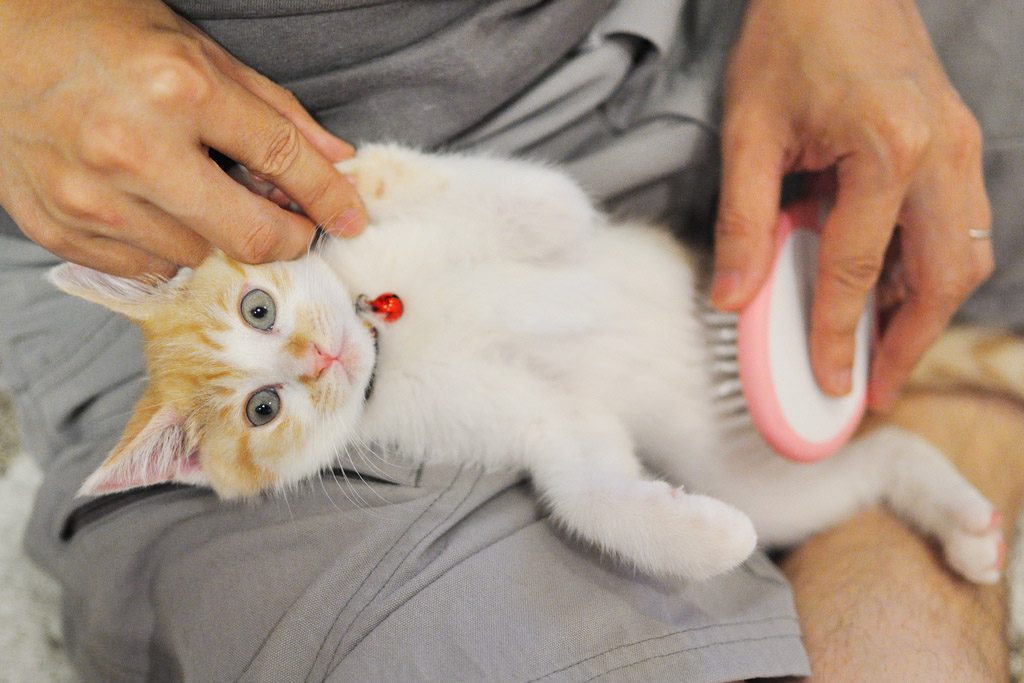It’s summertime, and the living is, well, hot and bug-infested. The summer months bring about a plethora of positives: time at the beach and time off work and time with your family and pets. However, it can be time consuming to have to slather on sunscreen and bug repellant before stepping outdoors. But it’s entirely necessary — not only for your family’s safety and protection, but also for your cat’s health and well-being.
Buzz Off!
One of summer’s biggest bug annoyances are — you guessed it — mosquitoes. These vexing Culicidaes are at their most vexing during July and August, so keep that in mind when out and about with your kitty. Mosquito bites can lead to numerous problems with cats, including heartworms and possibly Zika virus, though little is known about how that particular virus infects pets (i.e., no research has been done). The CDC states that, “at this time, animals do not appear involved in the spread of Zika virus.”
It’s always best to take preventive measures when it comes to mosquito bites and use mosquito repellants specifically for cats, especially if you’re traveling with your cat to an area where cases of Zika have been reported. However, stronger repellants should be used only for dogs — not your feline friends.
Fleas and ticks are another big problem to contend with during the summer months. It’s important to start prevention on your kitties early — before fleas become an infestation. Bombing your home is no fun, especially if you have multiple pets.
Remedies and Prevention
If you’re concerned about starting a flea-and-tick treatment for your cat, keep in mind that an ounce of prevention goes a long way. There are several kitty-safe remedies for all kinds of bug bites, whether they’re by fleas, ticks, mosquitoes, spiders, etc., which we have compiled in a handy list for your next shopping trip.
However, remember not to use any medications or products on your cat until you consult your veterinarian.
- Revolution – This FDA-approved topical medication for cats is a monthly application that prevents fleas, roundworms, hookworms and ear mites. It also combats against heartworms, which are an unfortunate result of mosquito bites. Talk to your veterinarian about a prescription for your cat.
- Bio Spot ACTIVE CARE Flea & Tick Spray for Cats – Recommended by Doctors Foster and Smith, a vet-operated company that’s been around since 1983, this repellant is approximately $7.99 for 8 oz. It repels mosquitoes, kills fleas, flea eggs and ticks, and is made specifically for cats.
No matter what prevention method you choose, all cats should be on flea/tick/heartworm prevention medication before ever venturing outside.
Here are a few other key points to keep in mind when shopping for bug prevention and repellents:
- Do not use DEET products. These are meant for humans — not animals!
- Use only feline-friendly repellents, sprays and treatments. Many pet treatments are specifically designed for dogs and are too strong for cats.
- Permethrin is not safe for cats. (You should also avoid letting it contact human skin). According to International Cat Care, permethrin poisoning in cats is one of the most commonly reported poisoning in cats worldwide.
- When outside with your kitty, keep moving! It is much harder for a tick or mosquito to land on a moving target.
- Many mosquitoes are most active around dusk and dawn, so consider letting your kitty roam in the afternoon.

A brush or flea comb can help you find unwanted hitchhikers. (Photo: yoppy/flickr)
How to check your cat for ticks
Ticks are easier to spot on cats than fleas because they’re larger and don’t tend to move around. To check your cat for ticks, start at your pet’s head and run your fingers down the cat’s body, being sure to feel under the collar as well. Ticks like to hide, so be sure to look in your cat’s ears, under the tail and between the toes. You can use a brush, flea comb or even a lint roller, according to Evercare, to aid in your search.
If you find a tick, it’s important to remove it immediately because these blood-sucking arachnids can transmit deadly diseases to pets within 24 hours. To safely remove a tick, follow these instructions from PetMD.
Don’t let prevention techniques and talk of ticks and medications scare you away from having fun during the summer months with your kitty. Be mindful, but remember that summer should be enjoyed by both humans and our significant furry others.





